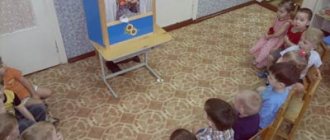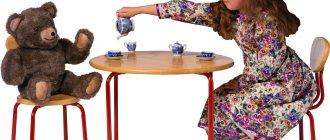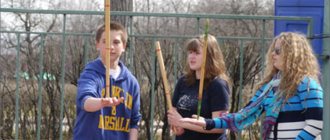The role of outdoor games in child development
It’s not for nothing that they say “movement is life.” After all, it is with the help of regular physical activity that the baby will be able to increase his immunity, improve his health and become resilient and dexterous. The role of outdoor play in the physical development of a child is invaluable. Such activities will teach the child to control his body, improve motor skills and help him master new capabilities of his body.
Active games are more than just entertainment. In fact, the number of benefits from such a pastime is considerable. The child learns to interact with other children; such activities help to relax, overcome shyness, become organized and disciplined, gain new knowledge about the world around him and consolidate already familiar information.
PECULIARITIES! Select games taking into account the age and developmental characteristics of the child.
Carrying out active entertainment in the fresh air is doubly useful. The lungs are well saturated with oxygen, the nervous system is strengthened, which helps improve the quality of sleep, increase appetite, reduce fatigue and irritability.
Working with children in kindergarten
Experts recommend conducting outdoor games in kindergarten. Sports games are poorly perceived at this age. It is best to offer them to those children who are already preparing for school. How to organize physical education taking into account age? Children from the younger groups are very active and mobile. They love to run, catch up, throw something, but their coordination is poorly developed. Children at this age perceive simple games well. They especially like activities with an invented plot.
One of the suitable games for children from younger groups is “Sparrows and the Car.” They begin it with a story addressed to the imagination of kindergarten students:
“In a large garden there lived little sparrows. All the birds had their own nests in the trees. On sunny days, sparrows flew out of their nests and landed on the ground. They were looking for grains and insects. Sometimes the birds flew up to the puddles and drank some water. One day a red car appeared in the garden and honked: “Beep, beep, beep.” The birds got scared and scattered to their nests.”
After the story, the children are invited to play such a game. At first, the role of the car can be played by a kindergarten teacher or one of the parents if the game is played at home. The children will be the sparrows, and the chairs will be their nests. The rules are as follows: if the car does not honk, the young participants in the game get up from their chairs, sit down on the floor and demonstrate the search for grains or water; when the car starts beeping, the children quickly run to the chairs and sit on them.
Kindergarten pupils from the middle groups are offered more complex outdoor games. Classes with a certain fictional plot continue to be actively conducted. Fairy-tale play images encourage children to perform certain roles. Suitable story games are “Kittens and Puppies”, “Mousetrap”. Gradually, children begin to become familiar with non-story games.
Children from older groups, in addition to plot and non-story games, are offered games with elements of competition. Pupils are selected with opponents who are equal in physical strength and development of motor skills (that is, they have an equal chance of winning). In preparatory groups for school, relay races, various sports games and exercises are additionally conducted.
Outdoor games for children goals and objectives
Outdoor sports games are an excellent way to introduce a toddler to a healthy lifestyle. With their help, you can teach your baby important skills and abilities. Not only teachers, but also parents themselves can use active activities for educational purposes.
The purpose of outdoor entertainment is not only to help children have fun in their leisure time, but also to teach such important things as teamwork, mutual assistance, agility, endurance, courage, and perseverance.
Regular physical activity can improve your baby's health. The parents’ task is to arouse in the child a genuine interest in outdoor entertainment, as well as teach him to play independently, observing all the necessary rules.
Also, using outdoor games with children is an excellent way to adjust the individual characteristics of children. With their help, a shy and timid child can be taught to be sociable and communicative, a hyperactive child to be disciplined and collected, etc.
It is important that each child plays both a leading and a secondary role in the game. For active children , activities that require concentration and clear actions, on which the final result will depend, are well suited. passive children the opportunity to get used to simple entertainment, gradually helping them develop speed and dexterity, and then, when positive dynamics are achieved, move on to more complex levels of activities.
REFERENCE! Before starting the fun, be sure to explain the rules to the children clearly and in detail, explain that compliance with them is very important, and you must always remain honest and fair in the game. After class, have a conversation with the kids, talk about the mistakes they made, tell them how to avoid them, and most importantly, don’t forget to praise them for their successes.
Classification of games
Before studying classifications, it is important to define sports and outdoor games. These are slightly different concepts. Sports games are the highest form of outdoor games. They, as the name suggests, are associated with sports and are based on competition. Simple outdoor or outdoor games based on sports are those that are based on running, jumping, throwing, etc.
Sports games are usually divided into 2 groups. The first of them is team. In such games, competitions take place between groups. Examples of these games include basketball, volleyball, hockey, and football. The second group is personal-team. Specific participants compete in them. This is observed in tennis, chess, and checkers.
The existing classification of outdoor games is based on taking into account the main motives for physical activity and the relationships of the children involved. In accordance with it, 3 groups of games are distinguished:
- non-team;
- transitional;
- team
Non-team games have certain rules. Children fulfill the given conditions, act in their own interests and do not interact with other participants. This means that there is no common goal for the players.
In transition games there is no constant common goal for all participants. Children act in their own interests. Each player has a specific goal. At a certain stage of the game, interaction with other children is necessary. As a result, all participants are included in collective activities.
In team games, children unite into teams. Each group has a common goal. To achieve it, participants act together. All children fully subordinate their personal interests to the aspirations of their team to achieve victory. Team games are especially beneficial. They teach children to establish contacts in a group, interact with other participants, and find a common language.
Outdoor games as a means of child development
Undoubtedly, outdoor games are necessary in the development of children of preschool and school age; they contribute to both the physical and mental development of the child - an indisputable fact. What benefits does a child receive by regularly practicing this pastime?
The most important thing is that children experience genuine pleasure from outdoor games, emotional uplift and sincere joy. Active activities are great for relieving psychological tension . When a child plays, he relaxes, abstracts himself, “blows off steam,” and learns to control his emotions. Many children gradually overcome their complexes.
Victories and defeats in gaming activities help to master the realities of life from childhood. The process of education and training takes place best in a playful form, because the baby is as relaxed as possible in such classes.
When faced with the next rules of the game, the child understands that they cannot be broken, this is excellent discipline and encourages him to be organized.
PECULIARITIES! To maintain your child’s interest in games, it is important to constantly and gradually complicate them and use new options. Use symbolic prizes in the form of sweets or give the winners souvenirs. Remember, while participating in interesting activities, children often forget about time and do not even feel tired.
By playing in a team, the baby learns to interact with other participants, which develops his communication skills and helps him establish communication with peers and find compromises.
Few people know, but outdoor games contribute to the development of intelligence. Many active activities involve not only participation in the physical education of children, but also require intense mental work and quick decision-making.
Classes help overcome many personal psychological barriers: shyness, isolation, uncertainty. In order to feel self-confidence, just one victory is enough. Such entertainment stimulates you to become better and helps you reveal your hidden capabilities. After all, many active games are competitive in nature, where each participant strives to be better than the rest.
Through active activities, the child practices expressing a different range of emotions. Karapuz rejoices in his victory, empathizes with the losing participants, supports and protects the weak, etc. All this requires difficult internal work on oneself.
IMPORTANT! If parents want to establish relationships with their baby and strengthen the emotional connection, especially during difficult crisis periods in development, outdoor games will help them with this.
Many active entertainments require the ability to quickly respond to various unexpected situations, take decisions on new problems, showing initiative, ingenuity and quick wits.
It is not difficult to instill an interest in outdoor games among modern children. Regularly conduct exciting, active activities, stimulate your child’s desire to lead a healthy lifestyle, and most importantly, set your own example.
MADOU Kindergarten No. 141 in Tyumen
“The role of outdoor games in the development of preschool children”
“A game is a huge bright window through which a life-giving stream of ideas and concepts about the surrounding world flows into the child’s spiritual world.” V.A. Sukhomlinsky
Physiologists believe that movement is an innate, vital human need. Complete satisfaction in movements is especially important in early childhood, when all the basic systems and functions of the body are formed. Without movement, a child cannot grow up healthy. No wonder they say: movement is life and an effective remedy. By moving, the child learns about the world around him, learns to love it and purposefully act in it. Movement is an important means of education; games give children bright moments of communication and develop behavioral experience.
Play is a vital need of a child; it occupies an important place in the life of a preschooler and is the main means of education. Among the variety of games, special mention should be made of outdoor games, in which all players are necessarily involved in active actions, which are determined by the plot and rules of the game, and are aimed at achieving a certain conditional goal. Outdoor play is of great importance for the comprehensive, harmonious development of children and is an effective means of developing a healthy lifestyle.
Outdoor games are easy to organize, always interesting for children and effective not only for physical development, but also social and intellectual, since many of them require ingenuity, reaction speed, attentiveness, and strategy development. Outdoor games with rules, like physical education classes, develop in children concentration of attention when memorizing movements, accuracy of movements and orientation in the environment, dexterity and speed of movements, the ability to perform movements at the same pace as a group, volitional qualities: endurance, courage, ability to overcome difficulties, the ability not to deviate from the rules, to experience defeat and victory, the ability to listen to comments and correct your movements.
The role of outdoor games in mental education is great: children learn to act in accordance with the rules, learn the meaning of the game, remember the rules, have spatial terminology, learn to act consciously in a changed game situation, and learn about the world around them. During the game, memory is activated, intelligence, fantasy, thinking, imagination are developed, and social qualities are formed. All this gives the child a basis to compare his actions with the actions of his peers, as a result of which conditions are created that contribute to the formation of the child’s initial forms of self-esteem and self-control, which is of great importance both for educational activities (future and present) and for a full life in a team.
Outdoor games are also of great importance for moral education.
Children learn to act in a team and obey common requirements. The presence of rules and the requirement to comply with them, the frequent change of drivers put the participants in the game in the position of equal partners, which helps strengthen emotional contacts between children. Children gradually learn in the game that they should not leave someone in trouble or laugh at someone else’s awkwardness, because this can happen to anyone. The achievement of common success depends on actions of mutual assistance.
Children perceive the rules of the game as a law, and conscious implementation of them forms the will, develops self-control, endurance, and the ability to control one’s actions and behavior. The game develops honesty, discipline, and a sense of justice. Outdoor play teaches sincerity and camaraderie. In collective games, children-organizers, children-leaders are identified who know how to persistently strive for a goal and carry others along with them.
In pedagogical science, outdoor games are considered as the most important means of a child’s comprehensive development. Outdoor play can be called the most important educational institution that promotes the development of physical and mental norms, rules of behavior, and ethical values of society.
Games improve the aesthetic perception of the world. Children learn the beauty of movements, their imagery, and they develop a sense of rhythm. By playing and implementing various forms of activity, children learn about themselves, their bodies, invent, create, and at the same time develop harmoniously and holistically.
Outdoor play prepares a child for work: children make play attributes, arrange and put them away in a certain sequence, and improve the motor skills necessary for future work.
Outdoor games are an excellent means of developing and improving children’s movements, strengthening and hardening their bodies.
The value of outdoor games is that they are based on various types of vital movements, and that these movements are performed in a wide variety of conditions. A large number of movements are accompanied by chemical processes that activate breathing, blood circulation and metabolism in the body, which significantly contributes to the development of muscles, bones, connective tissues, and increases the mobility of joints, especially the spine.
Play is a natural companion of a child’s life and therefore meets the laws laid down by nature itself in the child’s developing body - his insatiable need for cheerful movements. Creativity and imagination, which are an indispensable condition for most outdoor games, strengthen brain impulses, which, in turn, stimulate the pituitary gland, the activity of the thyroid gland and the entire endocrine system. Positive emotions and creativity are the most important factors for healing.
Games with an active physical component allow you to solve a whole range of important issues when working with preschoolers: satisfy their need for movement and stabilize emotions, teach them to control their body, develop not only physical, but also mental and creative abilities, moral qualities, etc.
Motor activity of a gaming nature and the positive emotions it evokes enhance physiological processes in the body and improve the functioning of all organs and systems. Emotional uplift (joy, pleasure, elation, inspiration) creates in children an increased tone of the whole organism.
In our work, we use outdoor games every day: both in organized activities, and during routine moments, and during walks in each age group.
Thus, outdoor games can be perceived as everyday children's fun, satisfying the body's need for movement, joint activity and joyful emotions, and can be considered as a pedagogical means of not only the physical, but also the social development of preschool children.
Sample games for sick and weakened children
Outdoor games of groups I and II are used in hospital settings. They are also offered to those children who have insufficient general physical training or who are in a sanatorium. Games of group I are recommended to be carried out from 2-3 weeks after the activity of the pathological process has decreased, i.e. during the period of remission. An example is “Kach-kach”. This is a game designed for children aged 2 to 9 years. Starting position – lying or sitting on the floor with legs extended. On command, children begin to swing their feet to the right and left, as well as bend and unbend, accompanying these actions with the words “kick-kick.” Repeat this game 2 to 6 times.
Games belonging to the next group begin to be offered to sick and weakened children 3-4 weeks after the activity of the pathological process has decreased. During physical activity, you are allowed to sit, stand, and walk. The game takes 10 to 15 minutes. An example of a game is “Sculptor” for children from 7 to 14 years old. The organizer of the game (one of the adults) becomes in the center. The children form a circle around him. The organizer, playing the role of a sculptor, imitates any movements. Children walk in a circle and imitate them. At one point, the sculptor claps his hands and freezes. All the children stop, also freeze in any desired position and seem to turn into statues. The best "statue" becomes the new "sculptor" and the game continues.
Sports entertainment and outdoor games from group III are used six months after recovery. They are offered in hospitals, and in sanatoriums, and in pioneer camps, and in sanatorium-type kindergartens. These games are designed for those children for whom a tonic regimen is recommended, as well as for schoolchildren in special and preparatory groups. Classes lasting 30 minutes are held in the gym, outside in summer and winter in good weather. One of the suitable games is “Ball School” for children from 6 to 14 years old. It can be a set of exercises:
- throwing the ball, clapping your hands behind your back and catching the ball;
- throwing the ball up, turning around and catching the ball;
- throwing a ball, sitting cross-legged on the floor and catching the ball, etc.
Games from group IV are designed for children in a state of stable remission of an existing disease. Classes usually consist of quite a variety of exercises. Children are required to move with a large amplitude, run, and react quickly.
In conclusion, it is worth noting that sports and outdoor games during a walk, at school or kindergarten are indispensable methods of physical education. They not only develop and strengthen the child’s body, but also contribute to the acquisition of knowledge about the world around him, the development of thinking, ingenuity, and important moral and volitional qualities.
What to rely on when choosing a game
First of all, it is necessary to create comfortable conditions for the game. This does not mean that all games should take place on specialized playgrounds or with special props. It is precisely the material side of the issue that in such cases does not play a role at all, since the child’s imagination allows him to make a sword out of any twig, and a desert out of a sandbox. In this situation, it is important to create psychological comfort. The child should feel free, he should have the opportunity to show initiative and independence.
It is imperative to think in advance about how to react to the negative aspects of any game. Here the parents themselves need to try to set a positive example, and try to help the child work through their negative emotions.
And, of course, any game should also be educational. But even here we must not forget about freedom and independence, since the child must come to any conclusions himself, otherwise it will not be effective.







